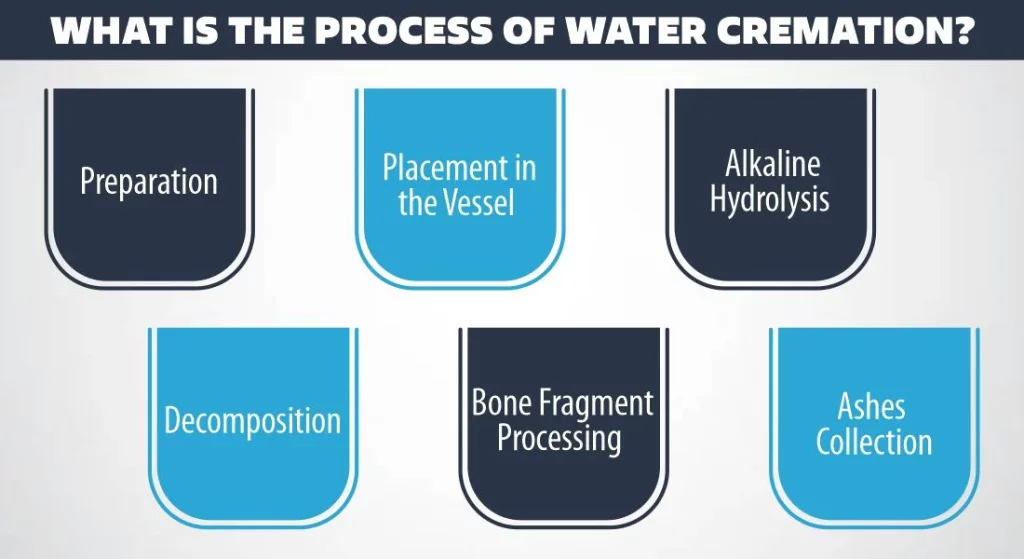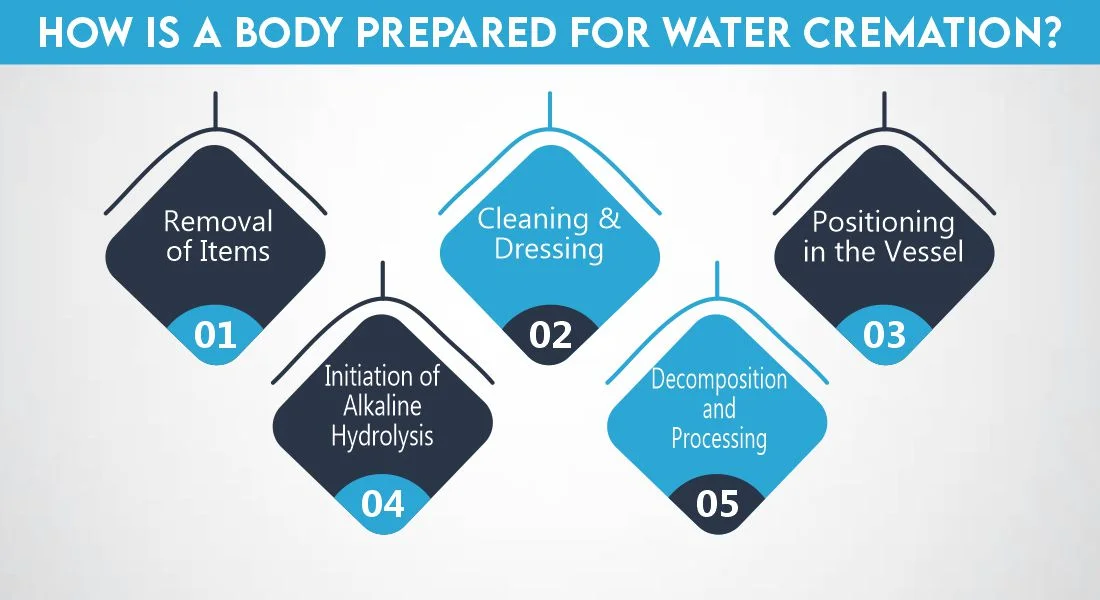Exploring Water Cremation: Ashes, Process, and Sustainability
Are you curious about a gentle, sustainable alternative to traditional cremation methods? Enter the world of water cremation, a groundbreaking approach to honoring loved ones with utmost respect for the planet. Dive into our comprehensive guide exploring the wonders of alkaline hydrolysis, where water, heat, and care harmonize to create a meaningful farewell.
From understanding the serene transformation of ashes in water to unraveling the eco-conscious process that sets this method apart, we explore it all. Delve into the legality, the preparations involved, and even the comparative analysis against conventional cremation methods.
What is Water Cremation?
Water cremation, or alkaline hydrolysis, is a modern disposition method for human remains. Instead of using intense heat like in traditional cremation, it employs a water-based process. The body is placed in a specialized vessel that combines water, heat, and alkaline chemicals to accelerate the natural decomposition process. This method gently dissolves the body, leaving only bone fragments, which are then processed into ashes.
What is Water Cremation Ashes?
Water cremation ashes are the remnants left behind after the process of water cremation. In this innovative and eco-friendly method, the deceased body is placed in a specialized vessel containing a combination of water and alkaline chemicals. This process accelerates the natural decomposition of the body, leaving behind only bone fragments.
Once the water cremation process is complete, the remaining bones are then further processed into a fine powder-like substance, which is what is commonly referred to as ashes. These ashes primarily consist of bone minerals, resembling the texture of traditional cremation ashes but with a finer and lighter appearance. These ashes hold the same significance and can be handled in similar ways to ashes produced through flame-based cremation.
Do Cremated Ashes Dissolve in Water?
Yes, cremated ashes from water cremation will gradually dissolve when placed in water. The ashes resulting from the water cremation process are finer and have a powder-like consistency. When exposed to water, these ashes break down and dissolve due to their composition, eventually dispersing and becoming part of the water.
This dissolution is a natural outcome of the alkaline hydrolysis method used in water cremation, where the remains are broken down into basic components, including bone minerals, which dissolve into fine particles when submerged in water.
What Happens When Cremation Ash Mixes with Water?
When cremation ashes mix with water, the ashes gradually disperse and dissolve into the water. The ashes resulting from water cremation have a finer and lighter texture compared to those from traditional flame-based cremation.
When these ashes come into contact with water, they break down into minute particles due to their fine consistency. Over time, the ashes disperse within the water, becoming less visible as they dissolve.
How Much Ashes Are Produced in Water Cremation?
The amount of ashes produced through water cremation is comparable to that of traditional flame-based cremation. On average, water cremation typically yields between three to seven pounds of ashes, depending on various factors such as the individual’s body composition, bone density, and the specific process used by the facility conducting the procedure.
How Much Does Life Isurance Cost?

What is the Process of Water Cremation?
The process of water cremation involves a series of steps aimed at gently breaking down the deceased’s remains in an environmentally friendly manner. Here’s an overview of the water cremation process:
1- Preparation
The body of the deceased is respectfully placed in a specialized vessel or chamber designed for water cremation. Any medical devices or objects that might interfere with the process are removed, and the body may undergo specific preparations as requested by the family or as per facility guidelines.
2- Placement in the Vessel
The vessel is filled with a mixture of water and alkaline chemicals, such as potassium hydroxide or sodium hydroxide, creating a solution that facilitates decomposition.
3- Alkaline Hydrolysis
The vessel is sealed, and heat and pressure are applied to initiate the alkaline hydrolysis process. This combination of heat, water, and alkaline chemicals accelerates the breakdown of organic materials, including the body, over several hours.
4- Decomposition
During the process, the body undergoes decomposition, leaving behind only the mineralized bone fragments and completely breaking down soft tissues.
5- Bone Fragment Processing
Once the decomposition phase concludes, the remaining bone fragments are carefully removed from the vessel. These fragments are processed into a fine powder-like substance, which is what is commonly known as cremated ashes.
6- Ashes Collection
The resulting ashes, consisting primarily of bone minerals, are collected and presented to the family for memorialization, scattering, or preservation according to their wishes.
How Long Does Water Cremation Take?
The duration of water cremation can vary based on several factors, including the equipment used, the size and composition of the deceased’s body, and the specific process followed by the facility conducting the procedure.
On average, the water cremation process can take anywhere from three to sixteen hours to complete. Factors such as body size, bone density, and the efficiency of the equipment used can influence the duration of the process.
The time required for the body to undergo decomposition and the subsequent processing of the bone fragments into ashes contributes to the overall duration of the water cremation process. Typically, facilities that offer water cremation services may provide families with an estimated timeline for the procedure.
Is Water Cremation a Sustainable Option for End-of-Life Practices?
Water cremation is considered a more sustainable alternative to traditional cremation. It uses less energy and does not emit greenhouse gasses associated with flame-based cremation. Additionally, it uses fewer resources and does not release harmful pollutants into the atmosphere.
Is Water Cremation Legal?
Well, yes water cremation is legal in an increasing number of states and countries. However, specific regulations and acceptance may vary, so it’s crucial to check local laws and regulations.
What States Allow Water Cremation?
States allowing water cremation vary, and the legality of this method may change over time. As of recent data, states like Colorado, Florida, California, Oregon, and Minnesota have permitted the practice, with more states considering its legalization.

How is a Body Prepared for Water Cremation?
Before a body undergoes water cremation, it typically undergoes a preparation process similar to that of traditional cremation or burial. Here are the general steps involved in preparing a body for water cremation:
Removal of Items
Any medical devices, prosthetics, or objects that could interfere with the process are removed from the body. This includes items such as pacemakers, implants, or jewelry.
Cleaning and Dressing
The body may be cleaned and dressed according to the family’s wishes or specific religious or cultural customs. Some families opt for specific clothing or personal items to accompany their loved ones during the process.
Positioning in the Vessel
The prepared body is respectfully placed in a specialized vessel or chamber designed for water cremation. The vessel is sealed securely before the process begins.
Initiation of Alkaline Hydrolysis
The vessel is filled with a mixture of water and alkaline chemicals, and the process of alkaline hydrolysis is initiated by applying heat and pressure.
Decomposition and Processing
Over the course of several hours, the body undergoes decomposition, breaking down into its basic components. Once the process is complete, the remaining bone fragments are carefully processed into ashes.
How Much Does Water Cremation Cost?
The cost of water cremation can vary significantly based on several factors, including location, the service provider, additional services chosen, and the specific preferences or requests of the family. Generally, the cost of water cremation may be comparable to or slightly higher than traditional flame-based cremation.
However, the average cost of water cremation in the United States ranges from $1,500 to $6,000, although prices can be higher or lower depending on various factors. Additional services such as transportation, urn selection, or memorialization options can also contribute to the overall cost. So, it’s essential for individuals or families considering water cremation to consult with local facilities offering this service to obtain accurate pricing information.
Water Cremation vs Fire Cremation
Below is a comparative table highlighting the key differences between water cremation (alkaline hydrolysis) and traditional flame-based cremation:
| Aspects | Water Cremation | Fire Cremation |
|---|---|---|
| Method | Uses water, heat, and alkaline chemicals | Uses high-temperature flames |
| Environmental Impact | Lower carbon footprint | Emits greenhouse gasses |
| Energy Consumption | Less energy-intensive | Requires high energy |
| Ashes Resulting Texture | Finer, lighter in color | Coarser, darker in color |
| Process Duration | Longer process (several hours) | Shorter process (few hours) |
| Equipment | Specialized vessel and alkaline solution | Cremation chamber and flames |
| Ashes Disposal | Dissolves in water | Ashes remain after cremation |
| Legal Considerations | Legality varies by jurisdiction | Widely accepted practice |
| Decomposition Process | Decomposes body with water and chemicals | Burns body with high heat |
Conclusion
Water cremation, with its eco-friendly approach and gentle process, offers a promising alternative for end-of-life practices. As acceptance and legalization grow, it provides individuals with a sustainable choice that aligns with environmental values. While considerations around costs, legality, and personal preferences remain, the evolving landscape of end-of-life options includes water cremation as a significant contender in this sensitive sphere of life’s conclusion.

Expert Life Insurance Agent and health insurance agent
Dylan is your go-to guy for life and health insurance at InsureGuardian. He’s helped over 2,500 clients just like you figure out the best insurance plans for their needs. Before joining us, Dylan was sharing his expertise on TV with Global News and making a difference with various charities focused on health. He’s not just about selling insurance; he’s passionate about making sure you’re covered for whatever life throws your way.
